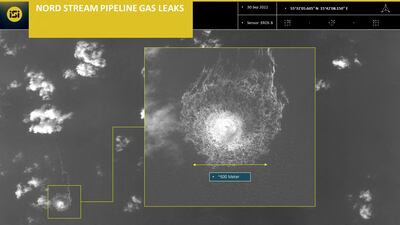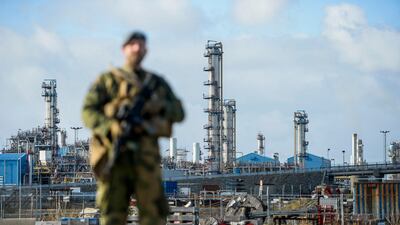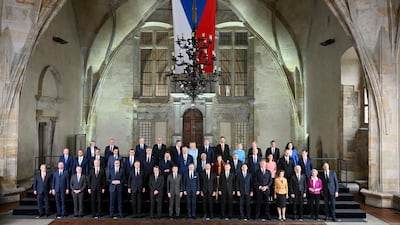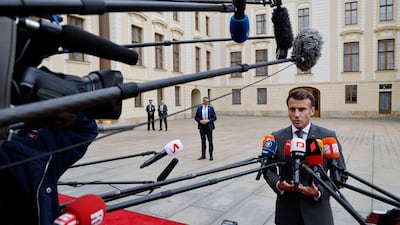European leaders told The National on Friday they would support cross-border security measures to protect vital undersea cables and energy links after an apparent act of sabotage in the Baltic Sea.
The EU’s 27 heads of state and government were briefed by Denmark on the aftermath of the Nord Stream leaks, in the first item of business in a summit on Friday.
While senior European figures said it was too soon to say whether Russia was behind the alleged blasts, several countries have responded by beefing up security around their energy terminals.
But discussions have been taking place on a common approach, given the energy crisis unfolding across Europe and the risk that a mishap in one country’s waters could worsen the whole continent’s energy crisis.
Proposals floated in Brussels include an EU-wide “stress test” to find potential weak points in key infrastructure, and using satellite surveillance to detect potential threats.
The peril is heightened by the energy crunch facing Europe this winter, with countries already having to make plans for managed blackouts if gas supplies run low.
“We have to watch our infrastructure very closely, especially the pipeline from Norway because right now it’s an important source, especially when Norway is increasing capacity,” Slovak Prime Minister Eduard Heger told The National.
Some countries may be able to guard their pipelines with their own security forces, but “if not, then we should help,” he said.
Norway is not an EU member but discussed the energy squeeze with its neighbours at a historic 43-nation summit in Prague on Thursday. The EU 27 were meeting separately on Friday.

Norwegian Prime Minister Jonas Gahr Store said the oil and gas-exporting nation would do its utmost to help ease the energy crisis in Europe, an EU official said.
The concern among European leaders is not only for energy pipelines, with other infrastructure such as cables and satellites also in line for extra protection.
European Commission president Ursula von der Leyen and French President Emmanuel Macron are among those calling for a common strategy.
Latvia’s Prime Minister Krisjanis Karins told The National on Friday that the first task was to draw up a list of European assets that could be vulnerable.
“It means, of course, increased costs for overseeing this, but this again, on a co-ordinated level, if we can identify what are the potential vulnerable areas, this is what we have to look for,” Mr Karins said.
The apparent sabotage “is very concerning to all of us because that’s one piece of critical infrastructure, but we have lots of others including data links and others, so this is something we really have to pay attention to.”
Four leaks were detected on the Russian-controlled Nord Stream 1 and Nord Stream 2 pipelines last week, in the exclusive economic waters of Denmark and Sweden.
Shortly before the incidents, two separate blasts were picked up on seismographs in Denmark, Sweden and Germany, adding to the suspicion of sabotage. Experts said it was implausible that the leaks were a coincidence.
Both pipelines were filled with gas despite the fact they were not delivering any to Europe. Russian exporter Gazprom cut off supplies via Nord Stream 1 last month, and Nord Stream 2 was suspended by Germany in February.
Naval and coast guard vessels patrolled the waters where gas bubbled to the surface, in a plume of gas described by UN researchers as possibly the largest methane leak on record.
Norway said it was increasing security on its continental shelf after the Nord Stream leaks, combined with reports of increased drone activity, heightened the alert level.
Investigators have yet to name a suspect, but some politicians pointed the finger at Russia because of its history of shadowy operations and its ongoing energy stand-off with Europe.
European summit in Prague - in pictures
Russia rejected the suggestion it would blow up its own pipelines, but some interpreted the blasts as a warning from Moscow that other pipelines could meet a similar fate.
The Kremlin attempted to deflect suspicion by suggesting the US was behind the blasts, after Washington opposed the construction of Nord Stream 2. The US denied involvement.
Asked on Friday whether they suspected Russia, Estonian Prime Minister Kaja Kallas said it was too early to say, while EU foreign policy chief Josep Borrell said: “We don't know exactly who has done it, but someone did it.”
European Parliament president Roberta Metsola said the EU needed to “wait and see” who the culprits were.
“But I also think we need to be better prepared for activities such as this in our seas – not only in the Baltic Sea but also elsewhere,” she said.
“I think from a security perspective we need to be prepared for all scenarios.”













